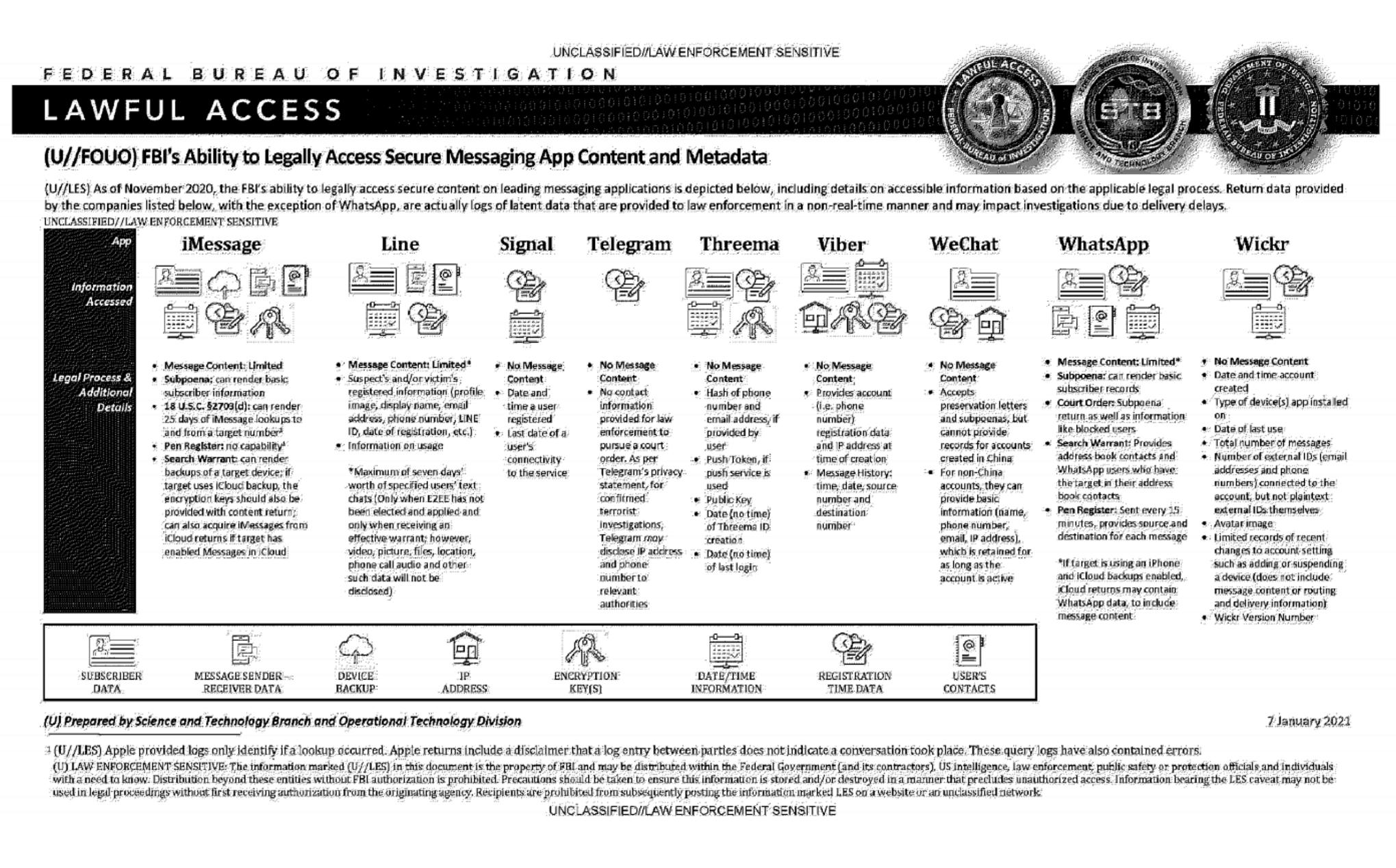An official FBI document dated January 2021, obtained by the American association “Property of People” through the Freedom of Information Act.
This document summarizes the possibilities for legal access to data from nine instant messaging services: iMessage, Line, Signal, Telegram, Threema, Viber, WeChat, WhatsApp and Wickr. For each software, different judicial methods are explored, such as subpoena, search warrant, active collection of communications metadata (“Pen Register”) or connection data retention law (“18 USC§2703”). Here, in essence, is the information the FBI says it can retrieve:
-
Apple iMessage: basic subscriber data; in the case of an iPhone user, investigators may be able to get their hands on message content if the user uses iCloud to synchronize iMessage messages or to back up data on their phone.
-
Line: account data (image, username, e-mail address, phone number, Line ID, creation date, usage data, etc.); if the user has not activated end-to-end encryption, investigators can retrieve the texts of exchanges over a seven-day period, but not other data (audio, video, images, location).
-
Signal: date and time of account creation and date of last connection.
-
Telegram: IP address and phone number for investigations into confirmed terrorists, otherwise nothing.
-
Threema: cryptographic fingerprint of phone number and e-mail address, push service tokens if used, public key, account creation date, last connection date.
-
Viber: account data and IP address used to create the account; investigators can also access message history (date, time, source, destination).
-
WeChat: basic data such as name, phone number, e-mail and IP address, but only for non-Chinese users.
-
WhatsApp: the targeted person’s basic data, address book and contacts who have the targeted person in their address book; it is possible to collect message metadata in real time (“Pen Register”); message content can be retrieved via iCloud backups.
-
Wickr: Date and time of account creation, types of terminal on which the application is installed, date of last connection, number of messages exchanged, external identifiers associated with the account (e-mail addresses, telephone numbers), avatar image, data linked to adding or deleting.
TL;DR Signal is the messaging system that provides the least information to investigators.
A nice place to discuss rumors, happenings, innovations, and challenges in the technology sphere. We also welcome discussions on the intersections of technology and society. If it’s technological news or discussion of technology, it probably belongs here.
Remember the overriding ethos on Beehaw: Be(e) Nice. Each user you encounter here is a person, and should be treated with kindness (even if they’re wrong, or use a Linux distro you don’t like). Personal attacks will not be tolerated.
Subcommunities on Beehaw:
This community’s icon was made by Aaron Schneider, under the CC-BY-NC-SA 4.0 license.
- 0 users online
- 18 users / day
- 241 users / week
- 639 users / month
- 1.28K users / 6 months
- 1 subscriber
- 1.67K Posts
- 28.2K Comments
- Modlog









Takeaways:
All of this was already well-known, of course, but it’s always nice to get confirmation.
And FYI, the info about Signal was confirmed as they received a subpoena a couple years back, and their response was part of the public court records.
Yeah, Signals response pointing to how their service works and than all the data consisting of only these two things war hilarious.
I’m curious what/if any info can be retrieved from Matrix servers?
I believe Matrix has the same encryption as Signal. Though there are some things that leak metadata, like reactions for some reason. Would like an investigation into it as well, as I pretty frequently use it. Obviously this is assuming it’s an encrypted chat. Though would also like to see the comparison of an invite only encrypted room, vs a public joinable encrypted room.
Nope. They are similar, but not the same: Comparison
Here’s my foolproof method of not having any issue with the FBI: Don’t do illegal stuff.
While Don’t break the law, asshole is solid advice for staying off the FBI’s radar, it’s not really a guarantee.
And sometimes, justice requires breaking the law. Remember that the Holocaust was legal and Stonewall was not.
Telegram seem to provide the least info, not signal.
But Telegram also have access to more info about its users, considering that messages are not end to end encrypted by default, than Signal does of its. This means that Telegram can share any data it wants, its users are just hoping that it won’t. In the case of Signal, they don’t have access to any meaningful data in the first place. Also leaving these here:
https://www.wired.com/story/the-kremlin-has-entered-the-chat/
https://tech.hindustantimes.com/tech/news/russian-court-directs-telegram-to-share-encryption-keys-to-access-users-messaging-data-story-1ZhjHvyTQJ89RhhNnp4bGL.html
Wonder what a difference it now makes with the iCloud “advanced Data protection” that provides end to end encryption for iCloud backups etc. in theory that should block the iCloud backup route.
I guess if you enable it on your device you are safe, but if your content is on another device that doesn’t enable it (it’s an opt in option), your content will be available.
Advanced data protection is across your entire account, not per device. According to Apple’s documentation they rotate the keys locally on your devices and then delete them from their services so they no longer have a key to give.